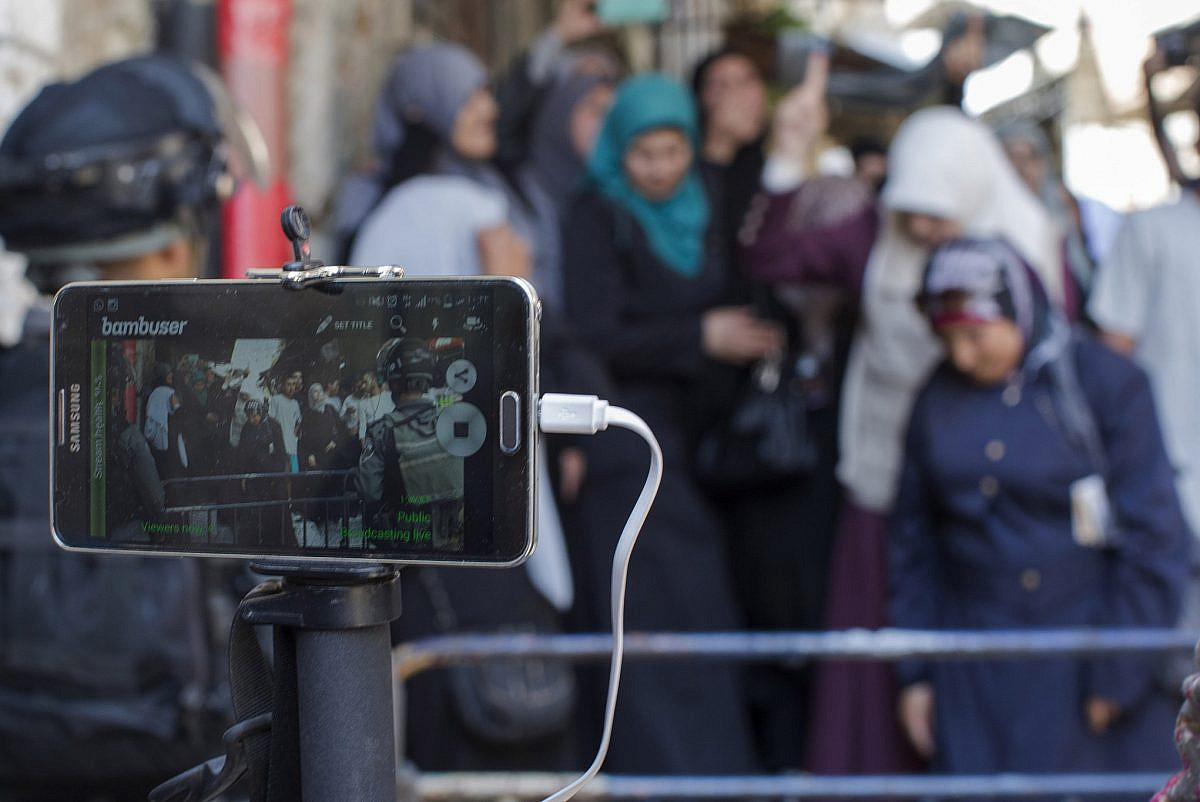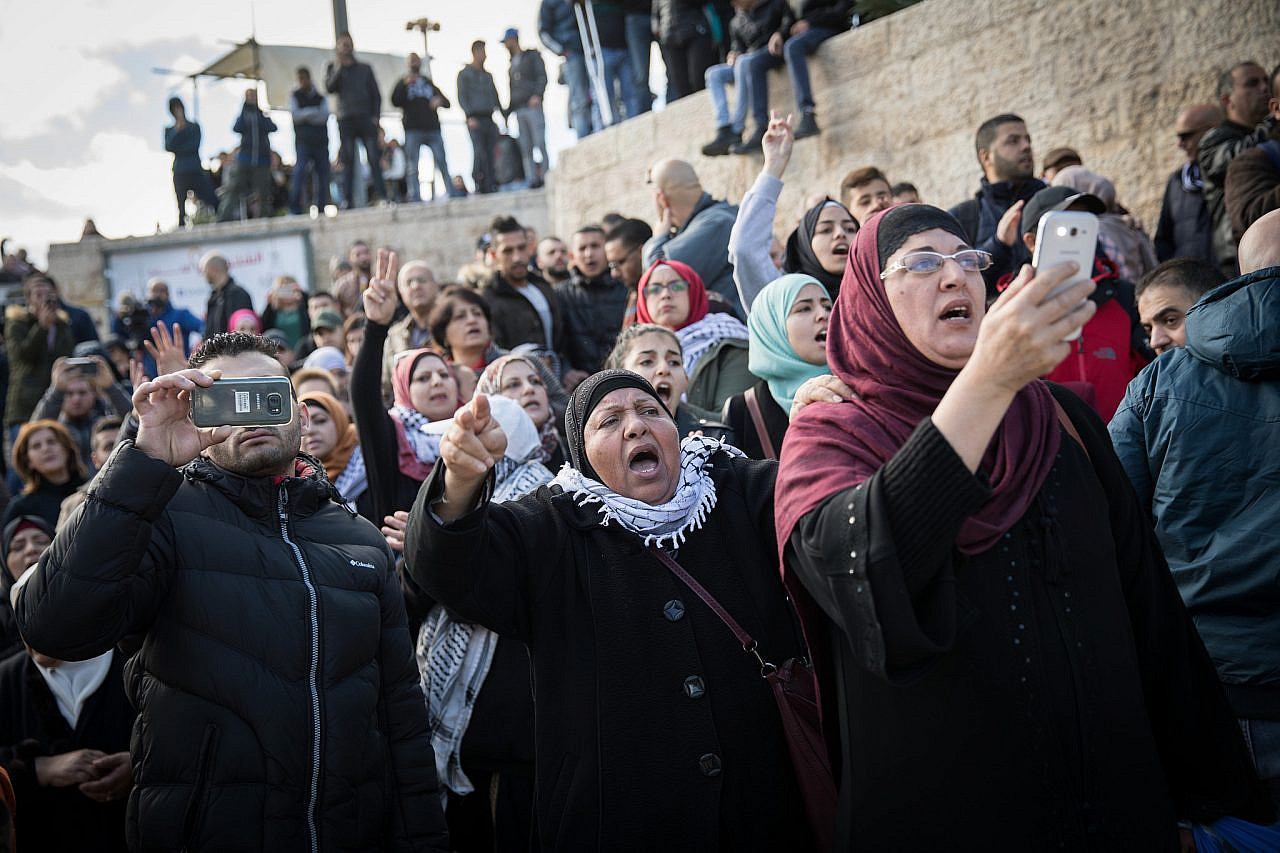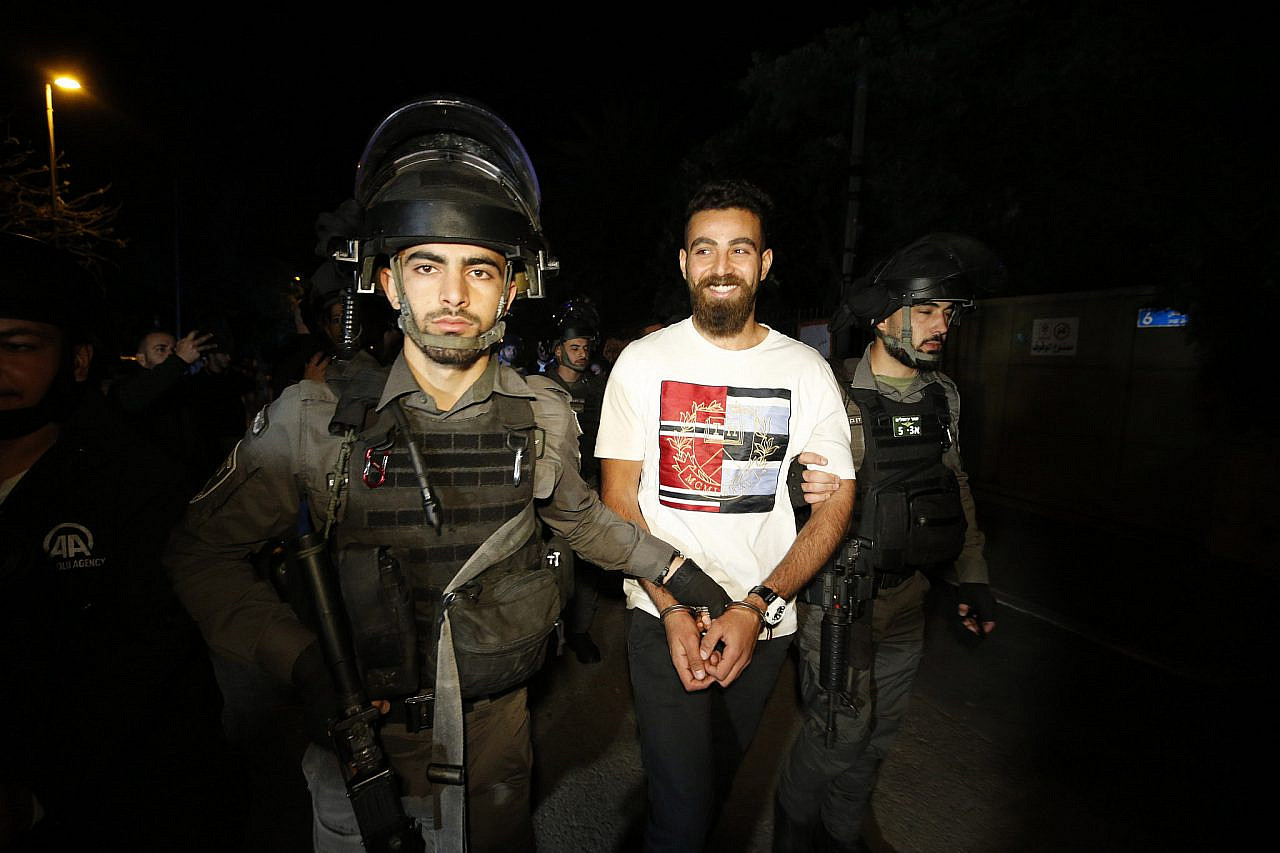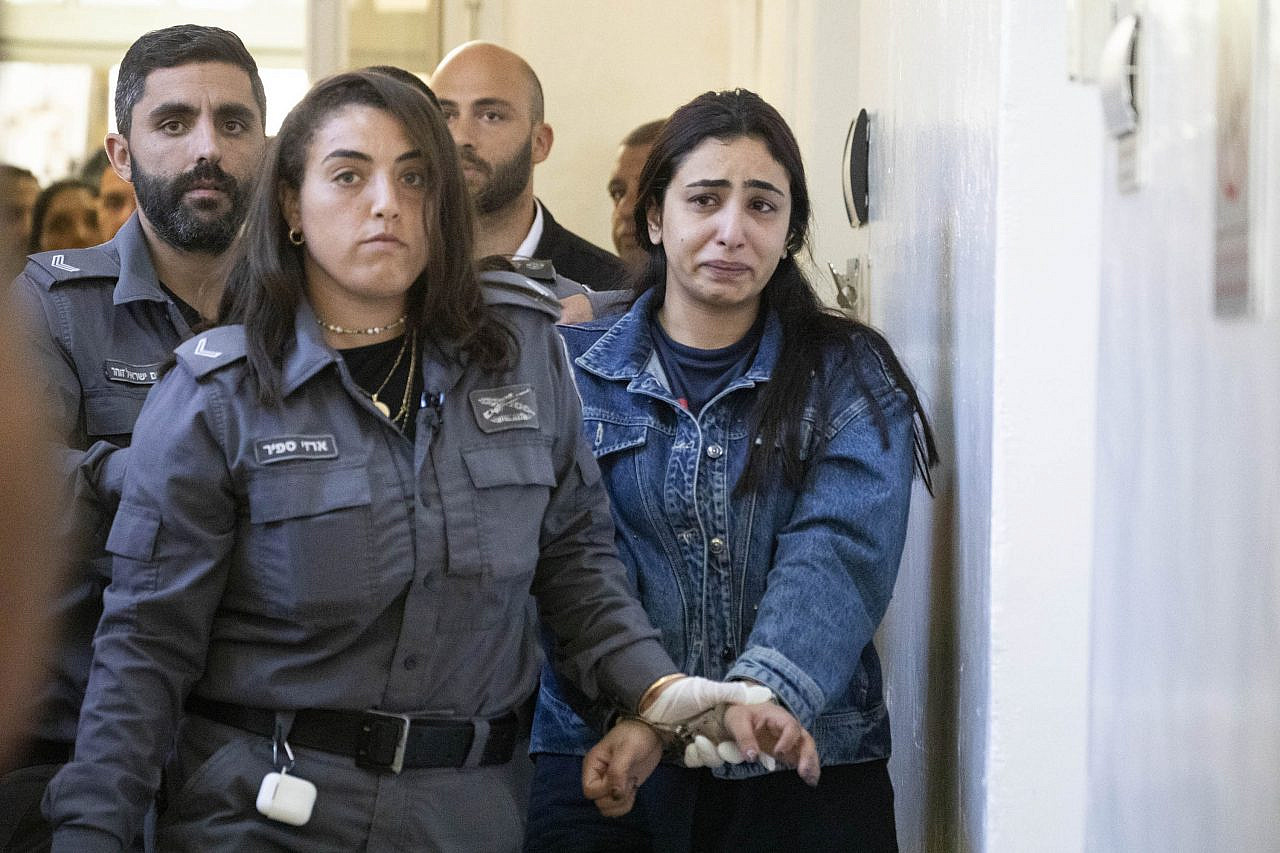For Palestinians, social media influence comes with the threat of prison

On the evening of April 2, 2023, Ramzi Abbassi, a prominent Palestinian journalist and social media influencer, drove back to his home in the occupied East Jerusalem neighborhood of Silwan. He had been at a nearby hospital visiting his mother, who was severely ill and would pass away just a few weeks later. It was Ramadan, and, before getting into his car, he video-chatted with his wife Shaima and his two young children, Kanan and Sanawat, promising to pick up bread on the way home to break the fast. As Abbassi neared his street, however, he encountered Israeli police at a temporary roadblock, who told him to stop driving and forced him out of the car.
According to Shaima, Abbassi was hit on the head, handcuffed, blindfolded, and pushed into a police cruiser. He would spend the next 90 days in the Russian Compound — an Israeli prison in West Jerusalem — facing a stack of allegations that he posed a threat to Israeli national security. In addition to his three months of detention and interrogation, Ramzi was sentenced to a year and one day in prison. And while the eventual charges were ostensibly unrelated to his online activity, Abbassi’s lawyer has no doubts that this is the principal reason for his client’s incarceration.
Charges against Palestinian social media users have surged in recent years — particularly in the wake of the Palestinian uprising of May 2021 known as the “Unity Intifada” — and Abbassi is just one of many whom Israeli authorities have surveilled, censored, detained, and incarcerated for their online activity. Usually, they are accused of inciting violence or sympathizing with a terrorist organization; however, when it comes to Palestinians, “incitement,” “sympathy,” and “terrorism” are often broadly defined. Legal advocates say that the crackdown on Palestinian online speech constitutes an alarming form of political persecution, resulting in a systemic restriction of Palestinian freedom of expression.
‘Random people would be filming him on the street’
Abbassi was already a celebrity when I first interviewed him in September 2021. It was a few months after historic protests had erupted across Palestine in response to state-backed settler expropriation in the East Jerusalem neighborhood of Sheikh Jarrah, and Abbassi was one of a number of local influencers who played a pivotal role in broadcasting images of Israeli settler violence and police brutality to the globe. His followers — already in the hundreds of thousands — had skyrocketed to almost half a million that summer. Appearing frequently on Hebrew and Palestinian television, quoted in the New York Times, and reposted by international celebrities, Abbassi had become an influencer through and through.
From the outset, Abbassi’s virality seemed to rub the Israeli authorities the wrong way. Police had confiscated his cameras during protests at Damascus Gate and Sheikh Jarrah. Border Police checking the IDs of Palestinian worshippers entering the Al-Aqsa compound warned Abbassi they were watching him. During our conversation in 2021, he explained that Meta, the parent company of Facebook and Instagram, had banned him from posting live footage after he streamed viral videos of police violence against protesters. Platform administrators had also threatened to delete his account if he continued to post similar content, he said.
“I’m very worried about the future,” Abbassi confessed. “I have so many stories on my page. The government can use any of that content against me and say I am inciting violence.” But the intimidation didn’t deter him from believing social media platforms could amplify Palestinian narratives worldwide. “There is something beautiful about social media,” Abbassi said, smiling. “You can share information as fast as lightning. One video can reach 1 million [viewers]. After this spring, we have CNN calling us up; we have a whole network.”
When I spoke to Shaima last month, she said that surveillance and harassment by Israeli authorities only intensified in the months and years following the summer of 2021. Abbassi had worked as a physical therapist at a school for children with disabilities in East Jerusalem for years; it was where he and Shaima, who also works as an educator with disabled children, first met. Yet Abbassi was fired from his job in early 2022. In a video posted on Facebook, Ramzi said he received a letter from Israel’s Civil Administration — the bureaucratic arm of the occupation — declaring he was “a harm to the general public and a harm to the educational process.”
Without a steady income, Abbassi turned to journalism full-time. “The pages and news companies he had been working with saw his skills, his presentation, and they encouraged him to pursue it,” Shaima said. He took courses to refine his documentary skills and worked with major news outlets in the Middle East. In the months before his arrest, he was filming “Jerusalem Taxi,” a documentary series modeled off the American reality show, “New York Taxi,” that featured interviews with prominent Palestinian Jerusalemites. All this time, Abbassi was living under heightened surveillance. “The police came to our house, and random people would be filming him on the street,” Shaima said.
‘They are trying to send a message through Ramzi’
Since 2016, incitement to violence or sympathy with a terrorist organization have become increasingly common charges against Palestinian social media users. Israel passed an updated counterterrorism law that year, which broadened the legal definition of incitement to encompass not only anyone who “publishes a direct call to commit a terrorist act” but also those who “publish praise, sympathy, encouragement or support of a terrorist act, or identification with it.”
According to legal experts, the definitions of both “incitement” and “terrorism” within the law are intentionally vague. “The articles of incitement and sympathy with terrorist organizations are very broad,” said Adi Mansour, a lawyer for the Palestinian legal center Adalah. “The definition of terrorism does not exist in the law. The definition of incitement does not exist specifically.”

Palestinians hold phone cameras during a protest at Damascus Gate, Old City of Jerusalem, December 7, 2017. (Hadas Parush/Flash90)
In 2021 alone, Israel’s state attorney’s office filed 16 indictments of “incitement” or “affiliation with a terror organization,” 15 of which were against Palestinian suspects. And these are only the cases civil rights organizations like Adalah can track: many Palestinian social media users are targeted for their online speech, but ultimately sentenced to lengthy jail times on other charges. Abbassi, for example, was finally sentenced to a year behind bars under Israel’s penal code; the prosecution accused him of conspiracy with a foreign agent. But Abbassi’s lawyer, Khaled Zabarqa, told +972 that his client was targeted because of his influential online profile.
“The charges mention his popularity — that he has half a million followers on social media. The indictment even mentions posts with nationalistic slogans,” said Zabarqa, who has worked on many similar cases over the years. “They are trying to send a message through Ramzi, a preventive message,” he added.
The crackdown on Palestinian political speech comes amid an upsurge in Jewish-Israeli right-wing violence on- and offline. In May 2021, Jewish supremacists carried out brutal attacks on Palestinian citizens of Israel, coordinating meeting points on Telegram and Facebook. Since Israel’s most right-wing government in history assumed power late last year, Jewish extremists have taken to social media to plan lethal pogroms in the West Bank towns of Huwara and Turmus Ayya and coordinate smaller riots through a handful of villages. According to a report released by Adalah in June 2023, the discrepancy in prosecuting Jewish Israelis for incitement to violence or terrorism “reaffirms Israel’s long-standing apartheid policies in law enforcement.”
Lawyers say the discriminatory application of the law amounts to nothing less than political persecution. Zabarqa, who has represented scores of Palestinian activists from Jerusalem and has been interrogated by Israeli authorities because of his own Facebook posts, told +972 that “there has been a huge increase in intimidation of influencers throughout ’48 [the territories within the Green Line], Jerusalem, and the West Bank since 2021.” Then, international commentators proclaimed Israel was losing its war on social media despite pumping millions into not-so-covert influence campaigns targeting Israeli citizens and international social media users.
During the Unity Intifada, Palestinian users garnered unprecedented online support for their struggles against settler expropriation and Israeli state violence. “Now it’s clear there is pressure on what the Palestinian influencer voice should be,” Zabarqa said. “[The authorities] want pro-Israel narratives online. They don’t want a pro-Palestinian narrative.”

Israeli security forces arrest a protester during a demonstration against the planned evictions of Palestinians from the East Jerusalem neighborhood of Sheikh Jarrah, Jerusalem, May 6, 2021. (Jamal Awad/Flash90)
Making Palestinians feel watched
Reports of the abuse of Israeli surveillance capabilities in Palestine have skyrocketed in recent years. From potent spyware to mass biometric databases, aerial surveillance, and drone warfare, human rights advocates say Israel’s advanced surveillance apparatus is used to police and control Palestinians throughout the region.
In June, the head of Israel’s Shin Bet (also known by its Hebrew acronym “Shabak”) announced AI was used to comb through Palestinian social media content and determine which users should be questioned and detained, sparking concerns that AI was taking over key decision making processes. According to a 2023 report by Amnesty International, “the constant surveillance Palestinians face means they not only live in a state of insecurity, but they are also at risk of arbitrary arrest, interrogation, and detention.” The point, in the words of Palestinian digital rights advocate Mona Shtaya, “is to make them feel watched no matter where they are.”
Adalah’s Mansour, who has worked on prominent incitement cases in recent years, said the policing of Palestinian social media users unfolds according to a certain logic. “The Shabak will invite the person for what they call a warning conversation,” with the intention to create a “chilling effect, to get to a place where the person does not post anymore or share stories.”
Mansour said that the authorities want Palestinians to feel like they are being monitored. “Sometimes, it ends there, and in other cases where people are not deterred, eventually it ends up with criminal charges,” he added. Because these conversations take place without any legal oversight, Mansour said, it is impossible to know how many Palestinians have been subjected to these warning conversations and subsequently deleted their social media pages or engaged in self-censorship to avoid incarceration.
Israeli authorities have pressed charges against a handful of prominent Palestinian journalists, politicians, and community leaders for their online activity. The list includes Mohammad Kana’neh, a leader of the secular Arab nationalist Abnaa el-Balad movement who has been under house arrest since 2021, and Sheikh Kamal Khatib, a Palestinian community leader arrested in 2021 and subjected to a travel ban after his release. Regular Palestinian social media users have also been detained and charged with prison or house arrest terms stretching for more than a year within the Green Line and across Jerusalem. This includes a dentist from Lyd imprisoned for over a year for allegedly endorsing Hezbollah in Facebook comments, and a journalist from Sheikh Jarrah who served almost a year under house arrest for her Facebook posts, among others.

Palestinian journalist Lama Ghosheh is led into a hearing at the Jerusalem Magistrate’s Court, accused of identification with a terrorist organization and incitement to violence because of Facebook posts, September 12, 2022. (Oren Ziv)
Although Israeli law criminalizes Palestinian speech, social media companies are equally complicit in surveilling and censoring Palestinian content. Israel’s cyber unit, a small yet potent body within the Justice Ministry, is responsible for requesting that social media platforms remove supposedly incendiary content. Journalists and advocates have long said the cyber unit mainly targets Palestinian users.
Since its founding in 2015, the unit has successfully petitioned Meta to delete tens of thousands of posts, pages, and accounts created by Palestinian users. Tamer Almisshal, an Arabic news presenter for Al Jazeera, was the most recent victim of such censorship; Almisshal’s page was taken offline the day Al Jazeera aired his investigation into Meta’s censorship of Palestinian content.
‘We have the ability to reach the people’
Abbassi will finally return home next summer, more than a year after being stopped by Israeli authorities that night last April. In the meantime, Shaima is allowed to visit him once a month, bringing their two young children along so that they can hug their father during the last 10 minutes of visitation. She does not want them to forget what he looks like. Abbassi insists on remaining in high spirits, Shaima said, and is preparing to return to journalism full time when he is released.
When we spoke in 2021, Abbassi knew dragnet surveillance and criminalization of Palestinian political speech by Israeli authorities made his arrest likely. But he also emphasized that none of the established avenues of political dissent — from the empty promises of peace made by the Palestinian Authority to the international community’s futile warnings — had stopped the settlers from moving into his neighbors’ homes or prevented Israeli authorities from throwing his friends into jail. “I didn’t ask to be an activist,” he said. “But now we have the ability to educate the people and to reach the people. It’s our responsibility.”
Despite the surge of political persecution and criminalization, Israeli and international commentators alike say Palestinian social media users are more influential than ever. Yet, as Shaima noted when she spoke to +972, “Ramzi is only a journalist because he isn’t able to work as a physical therapist anymore. It’s due to [the Israeli authorities’] actions that they force Palestinian people into roles they didn’t necessarily want in the first place.”


















